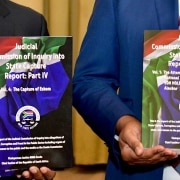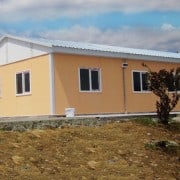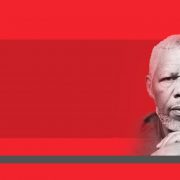|
Getting your Trinity Audio player ready...
|
Today Corruption Watch released its 2018 corruption report, Upholding Democracy, signalling the role of civil society and members of the public alike in exposing corruption and holding leaders to account during 2018.
The many voices reflected in this year’s edition, which marks 25 years of freedom and democracy in South Africa, point to the impact of corruption on the lives of ordinary people, who suffer the most as it strips them of human dignity and access to basic human rights. At a broader level, the report underlines how corruption erodes the pillars of our democracy, taking hold of key institutions of accountability that should exercise oversight of our leaders, and gives rise to the kinds of abuse of power and impunity that we have witnessed as a result.
Corruption Watch’s executive director David Lewis, in his focus on the need to support the institutions that protect our democracy, comments on how such key institutions – for example, Parliament and the National Prosecuting Authority – were compromised to sustain the corruption on the scale evident in the era of state capture. “On the other hand,” he adds, “we saw how other institutions of our democracy led the fight back against state capture. Robust and independent civil society, media and judiciary are key indicators of a functioning democracy and in our country, these are widely acknowledged for their leading role in confronting state capture.”
Read the report on Issuu or download it.
The trending corruption issues reported by the public over the year were abuse of power, bribery and procurement corruption, while the majority of the 4 200 corruption reports received in 2018 related to provincial government departments, followed by national departments and local government in third place. After 2017 and 2016, this is the third highest number of reports received since Corruption Watch’s launch in 2012. These three years account for 57% of the overall number of reports received between 2012 and 2018, and coincide with the rollout of several advocacy campaigns and high-level litigation cases.
As in previous years, Gauteng recorded the most reports of corruption with 45% of all cases received during 2018, followed by KwaZulu-Natal. This, we believe, is largely explained by the relatively large population of Gauteng, the scale of economic activity and the fact that national government administration is headquartered in the province. For the first time, Limpopo made the top three with 8% of reports, most likely a result of Corruption Watch’s public awareness drive in the province in late 2017. The largest number of reports received (22%) focused on corruption in the education sector, while complaints about the South African Police Service increased from 6% in 2017 to 9% in 2018, reaching their highest level over the seven-year period. Third on the list are reports of corruption and illegal activities at licensing centres throughout the country.
This report also provides a platform for a variety of young voices to share their opinions and expectations about the meaning of democracy, just 25 years old in our country. One reflects on her own vulnerability as a young woman living in South Africa; another reviews how the effective functioning of key institutions is dependent on individuals and entities to ensure that they fulfil their mandate. A third writer views the past 25 years as a period during which lines had to be drawn between the injustices of the past and a new commitment to justice, fairness and equality in our highly unequal society.
During its public engagements the Corruption Watch team heard first-hand accounts of people who have suffered the effects of corruption in a variety of ways. These included abuse at the hands of the police in communities in the Western Cape, the failure of mining companies and authorities to honour the mineral rights of people living in mining towns in the North West, and the dire consequences of corruption in the Gauteng Department of Health for those requiring public health services.
Corruption Watch’s other interventions over the year include strategic litigation, much of it focused on holding accountable perpetrators of corruption and maladministration. Among these is the application lodged by the organisation in November 2018 to have five former board members of Eskom declared delinquent following their dismal performance and lack of proper oversight of the parastatal during their tenure. The legal and investigations team has also contributed to policy and legislative matters, in particular submissions on the Traditional and Khoi-San Leadership Bill, which relate to the way in which community consultation on royalties and mining applications has been impeded by traditional leaders and traditional structures, and the under-representation of community interests.
“What I fear is that the liberators emerge as elitists, who drive around in Mercedes Benz’s and use the resources of this country to live in palaces and gather riches.”
Chris Hani, 29 October 1992
All of these interventions, and more – whether intended as long- or short-term activities – are driven by the issues which reporters bring to our attention, and which are detailed in our reports.
While Upholding Democracy paints a picture of the role Corruption Watch has played in combating corruption in 2018, and throughout its seven-year journey, it also provides a lens to review how far we have come since the birth of democracy in South Africa.
This is an opportunity to assess what needs to be done to undo the damage wrought by corruption over these past years. As the late freedom fighter Chris Hani – assassinated on this day 26 years ago – said: “What I fear is that the liberators emerge as elitists, who drive around in Mercedes Benz’s and use the resources of this country to live in palaces and gather riches.”
Media contact:
Phemelo Khaas Cell: 083 763 3472 E-mail: phemelok@corruptionwatch.org.za
Disclaimer: the images contained in this report are the intellectual property of Agent Orange Design (Pty) Ltd. Unauthorised use is strictly prohibited.








